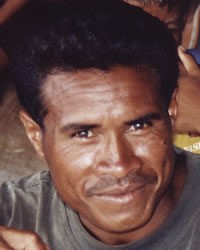Bajau in Indonesia

Photo Source:
Copyrighted © 2026
Anonymous All rights reserved. Used with permission |
Send Joshua Project a map of this people group.
|
| People Name: | Bajau |
| Country: | Indonesia |
| 10/40 Window: | Yes |
| Population: | 361,000 |
| World Population: | 361,000 |
| Primary Language: | Bajau, Indonesian |
| Primary Religion: | Islam |
| Christian Adherents: | 0.08 % |
| Evangelicals: | 0.08 % |
| Scripture: | Portions |
| Ministry Resources: | No |
| Jesus Film: | Yes |
| Audio Recordings: | Yes |
| People Cluster: | Tukangbesi of Sulawesi |
| Affinity Bloc: | Malay Peoples |
| Progress Level: |
|
Introduction / History
The Bajau (also known as Bayo, Gaj, Luaan, or Lutaos) are a highly mobile maritime people group found throughout the coastal areas of Sulawesi, Maluku, Kalimantan, Sumatera and East Nusa Tenggara. They can also be found in the neighboring countries of Malaysia and the Philippines. Their high mobility led outsiders to refer to them as "Sea Gypsies". In Eastern Indonesia, the largest number of Bajau are found on the islands and in the coastal districts of Sulawesi. They speak the language of Bajau. The Bajau language is part of a larger linguistic grouping called the Sama Bajau which also includes the West Coast Bajau of Malaysia (Sabah) and the Sinama, Mapun, Balangingi and Yakan of the Philippines.
What Are Their Lives Like?
While most Bajau have begun to live in houses built on stilts in shallow water, some Bajau are boat dwellers. Among the Bajau boat dwellers, local communities consist of scattered moorage groups made up of families whose members regularly return, between intervals of fishing, to a common anchorage site. Two to six families will group together in an alliance to regularly fish and anchor together, often sharing food, nets and gear and pooling labor.
Today, fishing is primarily for market sale. Fishing activity varies with the tides, monsoonal and local winds, currents, migrations of pelagic fish and the monthly lunar cycle. During moonless nights, fishing is often done with lanterns, using spears and hand lines. Most fish are preserved by salting or drying. In some cases turtles are caught and kept under the house until an appropriate feasting time (such as the marriage of a son) – to the chagrin of marine conservationists. The boats that are used as family dwellings vary in size and construction. In Indonesia and Malaysia, boats average 10 meters in length and 2 meters in width. They are plank construction with solid keel and bow sections. All are equipped with a roofed living area made of poles and straw matting and a portable earthenware hearth, usually carried near the stern, used for preparing family meals.
The boat-dwelling Bajau (in contrast to their neighbors) see themselves as non-aggressive people who prefer flight to physical confrontation. Therefore, the politically dominant groups of the region have historically viewed the Bajau with disdain as timid, unreliable subjects.
What Are Their Beliefs?
The Bajau are Sunni Muslim of the Shafi'i school. Claims to religious piety and learning are an important source of individual prestige. Owing to their nomadic way of life, the Bajau moorage groups lack mosques (mesjid) and must rely on the shore-based or stilt-house communities for this.
Like many Muslim peoples in Indonesia, the Bajau mix animistic practices with their observance of Islam. Among boat dwelling communities in particular, community shamans (dukun) are assembled at least once a year for a public séance and nightly trance dancing. In times of epidemic illness, they are also called on to set a spirit boat adrift in the open sea beyond the village or anchorage site to remove the illness-causing spirits from the community.
What Are Their Needs?
Due in part to their nomadic lifestyle, many Bajau are illiterate. They need education and infrastructure development and renovations in healthcare. Medical workers, facilities and services in their communities are very inadequate.
Portions of scripture, as well as the JESUS Film, are available in the Bajau language.
Prayer Points
Ask God to send medical workers and teachers to the Bajau to teach and serve them in the context of sharing the gospel.
Pray that God will give the Bajau a hunger for the truth and the spiritual discernment to recognize the Bible as truth.
Ask God to open doors for the showing of the JESUS film among the Bajau.
Pray for a Disciple Making Movement among the Bajau that will result in the planting of churches that multiply through many generations.